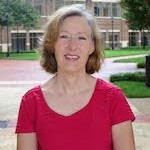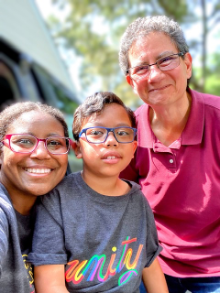Welcome!
Focusing on FME - Family Mentoring Experience
At the heart of Va-LEND is the Mentoring Family who share and open up their lived experience to Va-LEND Trainees to help them on their journey as they become leaders and advocates in the disability community. Each month an FME story will be highlighted and celebrated.
We want to wish Kate Flinn a happy 5 year anniversary as the Family Mentorship Experience coordinator!
Read Kate’s reflection on the last 5 years with VaLEND:
 “I am a proud former LEND trainee, non academic track in the family discipline. My faculty advisor, Elaine Ogburn, was the original FME coordinator who helped start the program in 1999. When she was ready to retire a few years after I received my certificate, Elaine suggested I apply for her job and wrote a wonderful recommendation for me to submit with my application. I was lucky enough to get the job and started as the Va-LEND FME coordinator in the spring of 2019.
“I am a proud former LEND trainee, non academic track in the family discipline. My faculty advisor, Elaine Ogburn, was the original FME coordinator who helped start the program in 1999. When she was ready to retire a few years after I received my certificate, Elaine suggested I apply for her job and wrote a wonderful recommendation for me to submit with my application. I was lucky enough to get the job and started as the Va-LEND FME coordinator in the spring of 2019.
At that time, there was only one LEND program in Virginia, at Virginia Commonwealth University (VCU). It was centrally located to the Richmond region as all classes and interdisciplinary clinics were in person, as were all trainees and FMEs. The number of trainees averaged 20-22 and we bookended the LEND program with a Fall and Spring picnic that included all faculty, staff, trainees, and their FME families. These picnics generally had around 75-100 participants, always took place in inclusive settings, and provided a wonderful opportunity for all program participants to connect, make friends, and see firsthand the scope of the program.
When the COVID-19 pandemic hit in 2020, LEND, as most other programs, classes, and organizations at VCU and across Virginia went to 100% virtual. Being virtual was a bit of a challenge for the 2020-2021 FME since the most meaningful interactions generally take place in person in a variety of locations where the trainee has the best opportunity to observe the family and child/children in environments where they have more freedom to be themselves. At this same time, Va-LEND had changed to be a statewide program and we had several trainees who were in parts of the state outside the Richmond area. Being completely virtual, I thought it best to recruit mostly "veteran" FME families as I felt, since they were already familiar with the LEND program and FME protocols and structure, the "strangeness" of virtual visits wouldn't add too much of a learning curve to the process.
In 2021-2022, the Blue Ridge LEND at the University of Virginia formed. Va-LEND's trainee outreach widened and even more trainees from across the state were accepted. Trainees and FME families were offered the choice of virtual or in-person visits, or a hybrid of the two and several families agreed, with their trainees, to return to in person visits, while others wanted to remain virtual for safety reasons. Having so many choices for the FME has proven to be a very positive change as scheduling has always been one of the most difficult aspects of the FME for both busy trainees and families.
It is my 5th year as the FME coordinator and I couldn't be happier with the position and the LEND program. As the mom of two children on the autism spectrum, a longtime community advocate, and a former trainee, I know the FME offers a unique opportunity for special needs families to share their lives with the professionals and advocates who work and will work with us.”
-Kate Flin
 The Lipton-Lessors Family
The Lipton-Lessors Family
Shirley, India, and Dylan have participated in the FME for 9 years. Dylan has multiple and complex special needs. He was born prematurely and battled an infection for 101 days in the NICU, and has been in and out of the hospital several times over this time. The Lipton-Lessors became interested in participating in the FME after meeting the former FME coordinator an event. They were happy to participate and very grateful to have the opportunity to help in the development of new trainees.
This wonderful family believes the FME offers a positive service to families with children with neurodevelopmental disorders and disabilities. They feel there is a huge need in the medical services fields to know much more about the depth and breadth of what life is like outside of the treatment. They also feel the mentoring experience helps the trainees to understand and balance decisions when making treatment plans as well as assists them as future professionals.
The Lipton-Lessors have learned from their many years as a mentoring family that it is really important for trainees to not be afraid to ask many questions because this is key to helping them learn and better understand what life is like for the families and the children. India suggested that trainees not be shy and come with specific ideas of what they want to learn so families can expand from the trainee knowledge from there. In addition, she said that It is helpful to go to a variety of locations, be willing to be open, help out a bit, and expect a little bit of adventure. This makes it worth it!
Reflections From Elaine Ogburn, First FME Coordinator
I had the pleasure and the honor of working (part-time) for Va-LEND for 19 years, from 1999 to 2018, as the Family Mentorship Experience Coordinator. My primary qualification for the job of “family discipline faculty” was my daughter Becky, who has Down syndrome. From accompanying me to LEND faculty meetings (7:30 am!) before her preschool opened, to enjoying FME picnics over many years, to presenting along with me at LEND and other VCU classes in her late teens and early 20s, Becky participated in many aspects of my years at LEND and in my early years was almost as well-known to the LEND faculty as I was.
Families are the heart of the FME, and during my years 115 generous families participated in the FME, giving our LEND trainees a chance to get to know them and their children with disabilities through several visits with them at the family’s home and other places key to their life. The trainees’ mission was to get to know their mentoring families not as clients, or patients, or students, but as PEOPLE. Individuals of all ages who just happen to have disabilities and their families who best know, understand, and love them have lived experience that their service providers definitely need to tap in order to best serve them.
A person can go to school to learn to be a doctor, teacher, or any other professional discipline, but the only way to learn about being a person with a disability or a family member is to live that life. That’s real commitment! The more that professionals embrace and tap the gifts and lived experience of individuals with disabilities and their families, the better the services provided to people with disabilities will be in real life. Go family discipline! Go person- and family-centered care!
Family is at the Heart of Va-LEND
 For over 20 years Family Mentorship Experience (FME) has been an integral part of Va-LEND. The goal of FME is for the mentoring families to teach the students about their life as a parent of a child with special healthcare needs. Trainees schedule at least five face-to- face visits during the academic year with their family and maintain an activity log. Mentoring families often participate over a period of years, and can choose to be part of Va-LEND for many reasons. "I chose to be part of this discipline at Va-LEND to raise awareness and advocate for people with disabilities. Not everyone is aware of the daily challenges. Parenting is hard enough, however having a child with a disability definitely amplifies that. Learn how family is at heart of Va-LEND.
For over 20 years Family Mentorship Experience (FME) has been an integral part of Va-LEND. The goal of FME is for the mentoring families to teach the students about their life as a parent of a child with special healthcare needs. Trainees schedule at least five face-to- face visits during the academic year with their family and maintain an activity log. Mentoring families often participate over a period of years, and can choose to be part of Va-LEND for many reasons. "I chose to be part of this discipline at Va-LEND to raise awareness and advocate for people with disabilities. Not everyone is aware of the daily challenges. Parenting is hard enough, however having a child with a disability definitely amplifies that. Learn how family is at heart of Va-LEND.